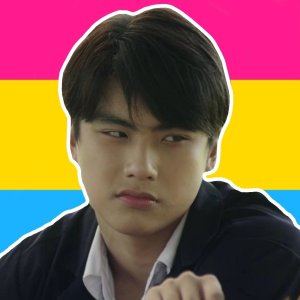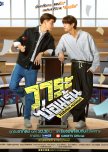This review may contain spoilers
Weak start, strong half-time, weak ending
No spoilers:
Overall, this show convinced me because of Zo's character and how the script only revealed his backstory bit by bit, making me want to re-watch the show at least once. Where the show almost lost me was at the very slow beginning and the convoluted end. In retrospective, only episodes 3-9 grabbed my attention, either because the relationship was still developing or struggling. Another thing I liked was the second couple, as they felt enriching to the story and also had an interesting plot. However, one of the main parts (?) of the story – the debating club – I think could've been used more effectively and didn't feel as important as it was supposed to be. For me, the topics they debated were too fictional to take them seriously.
Acting-wise, I do feel like Joong and Dunk improved from Star in My Mind. Especially, Dunk portrayed Zo's nervousness perfectly with his physical responses to Joke's advances. I'm certain that some scenes/situations helped bring across these emotions because it was also their first time shooting scenes like this. However, I see the need for both of them to act separately from each other, so that they can learn from other situations, plots, and more experienced actors. Of course, I want to see them again together in a series, but then it must be outside the uni-context and maybe in another genre – be it action, thriller, more mature or full on rom-com where you sit on the other side of the screen laughing so hard you have to cry.
Let's talk directing-style: I think in the special episode that aired before Hidden Agenda was released it was mentioned that this was the first or one of the first bigger projects for the director and I think you can feel that. Sometimes I felt lost as to how much time has passed (especially episode 7). I was missing transitional-shots or something that gave a clue as to where and when we are in the scene. Also, I'm not a huge fan of this very milky background we got most of the time (again, episode 7) – at some point it felt over-used. It could've had a better/bigger impact I think if it would've been used more sparingly. Additionally, the music often felt quite random. Maybe a bigger selection would've made the job easier and could've improved to convey certain feelings in some scenes.
Spoilers included:
That Zo is a pan- or bisexual character came to me as a pleasant surprise because I read his behaviour when he realized his feelings for Joke as i'm-getting-to-know-my-sexuality kinda thing. As it turns out, however, this was only him dealing with the trauma experienced back when he was a kid, and he had feelings for a boy for the first time. So, now the first 7 episodes change their meaning – at least for me. And I love that we don't have this i'm-getting-to-terms-with-my-sexuality-trope, but rather deal with how-can-I-overcome-this-trauma.
What I also admire about Zo is that he stays true to his principles. He communicates very clear and doesn't make any distinction between classmate, friends, or boyfriend. A few examples: As soon as he figured out his feelings for Joke, he acts on them (the kiss in episode 4). Next he goes to Nita because he realized the difference in his romantic feelings towards Joke and his feelings of admiration towards Nita. When Joke is again pushy with the food, and he gets into a fight with one of Zo's friends, Zo ends the fight and takes Joke with him to tell him off in a mature way. And of course when Joke's hidden agenda gets revealed, and he doesn't apologize correctly, Zo doesn't get weak and waits for Joke to come to his senses and (hopefully) learn from his mistake. Now of course Zo is not perfect as I don't like the silent-treatment he's giving Joke, but again, no person is perfect, and I love it that we see more characters like that.
Joke being the green-flag and supportive boyfriend was a great watch. Even though he really frustrated me in episode 9 when it took him the entire episode to realize what he did wrong – but I'm here for it. What I admire about Joke was his consistent reassurance he gave Zo about his feelings for him. He tried to not pressure Zo which I think is important to show more in BL as there are too many storylines out there where pressure is romanticized. I think we saw the peak of it in episode 8 where we got the super hyped NC scene.
While Zo and Joke were the example for good communication, I feel like the second couple, Jeng and Pok, showed us what happens when you don't communicate your thoughts and feelings honestly. However, their conflict also got resolved in a mature way where Jeng realized how his behaviour hurt his boyfriend, and Pok learned that he needed to communicate his feelings better for Jeng to be able to act on them.
Now the last two episodes felt really out of place, I think that's because Hidden Agenda was originally supposed to run only for 10 instead of 12 episodes? Anyhow, the end felt convoluted and rushed because they squeezed in Joke's family drama and another quarrel between Zo and Joke. It's possible, that if it had been 12 episodes from the beginning they could've built up the Joke situation way better. Now, his family-situation was used to explain Zo's misunderstanding with his mom – a classic “don't tell but show”-situation where the time ran out to show rather than tell what just happened. Because without Zo's explanation, I don't think I would've got his isolation in episode 12. In the end I would've been more happy with just 10 episodes because after episode 9 I didn't feel as excited anymore to wait for each episode.
Overall, this show convinced me because of Zo's character and how the script only revealed his backstory bit by bit, making me want to re-watch the show at least once. Where the show almost lost me was at the very slow beginning and the convoluted end. In retrospective, only episodes 3-9 grabbed my attention, either because the relationship was still developing or struggling. Another thing I liked was the second couple, as they felt enriching to the story and also had an interesting plot. However, one of the main parts (?) of the story – the debating club – I think could've been used more effectively and didn't feel as important as it was supposed to be. For me, the topics they debated were too fictional to take them seriously.
Acting-wise, I do feel like Joong and Dunk improved from Star in My Mind. Especially, Dunk portrayed Zo's nervousness perfectly with his physical responses to Joke's advances. I'm certain that some scenes/situations helped bring across these emotions because it was also their first time shooting scenes like this. However, I see the need for both of them to act separately from each other, so that they can learn from other situations, plots, and more experienced actors. Of course, I want to see them again together in a series, but then it must be outside the uni-context and maybe in another genre – be it action, thriller, more mature or full on rom-com where you sit on the other side of the screen laughing so hard you have to cry.
Let's talk directing-style: I think in the special episode that aired before Hidden Agenda was released it was mentioned that this was the first or one of the first bigger projects for the director and I think you can feel that. Sometimes I felt lost as to how much time has passed (especially episode 7). I was missing transitional-shots or something that gave a clue as to where and when we are in the scene. Also, I'm not a huge fan of this very milky background we got most of the time (again, episode 7) – at some point it felt over-used. It could've had a better/bigger impact I think if it would've been used more sparingly. Additionally, the music often felt quite random. Maybe a bigger selection would've made the job easier and could've improved to convey certain feelings in some scenes.
Spoilers included:
That Zo is a pan- or bisexual character came to me as a pleasant surprise because I read his behaviour when he realized his feelings for Joke as i'm-getting-to-know-my-sexuality kinda thing. As it turns out, however, this was only him dealing with the trauma experienced back when he was a kid, and he had feelings for a boy for the first time. So, now the first 7 episodes change their meaning – at least for me. And I love that we don't have this i'm-getting-to-terms-with-my-sexuality-trope, but rather deal with how-can-I-overcome-this-trauma.
What I also admire about Zo is that he stays true to his principles. He communicates very clear and doesn't make any distinction between classmate, friends, or boyfriend. A few examples: As soon as he figured out his feelings for Joke, he acts on them (the kiss in episode 4). Next he goes to Nita because he realized the difference in his romantic feelings towards Joke and his feelings of admiration towards Nita. When Joke is again pushy with the food, and he gets into a fight with one of Zo's friends, Zo ends the fight and takes Joke with him to tell him off in a mature way. And of course when Joke's hidden agenda gets revealed, and he doesn't apologize correctly, Zo doesn't get weak and waits for Joke to come to his senses and (hopefully) learn from his mistake. Now of course Zo is not perfect as I don't like the silent-treatment he's giving Joke, but again, no person is perfect, and I love it that we see more characters like that.
Joke being the green-flag and supportive boyfriend was a great watch. Even though he really frustrated me in episode 9 when it took him the entire episode to realize what he did wrong – but I'm here for it. What I admire about Joke was his consistent reassurance he gave Zo about his feelings for him. He tried to not pressure Zo which I think is important to show more in BL as there are too many storylines out there where pressure is romanticized. I think we saw the peak of it in episode 8 where we got the super hyped NC scene.
While Zo and Joke were the example for good communication, I feel like the second couple, Jeng and Pok, showed us what happens when you don't communicate your thoughts and feelings honestly. However, their conflict also got resolved in a mature way where Jeng realized how his behaviour hurt his boyfriend, and Pok learned that he needed to communicate his feelings better for Jeng to be able to act on them.
Now the last two episodes felt really out of place, I think that's because Hidden Agenda was originally supposed to run only for 10 instead of 12 episodes? Anyhow, the end felt convoluted and rushed because they squeezed in Joke's family drama and another quarrel between Zo and Joke. It's possible, that if it had been 12 episodes from the beginning they could've built up the Joke situation way better. Now, his family-situation was used to explain Zo's misunderstanding with his mom – a classic “don't tell but show”-situation where the time ran out to show rather than tell what just happened. Because without Zo's explanation, I don't think I would've got his isolation in episode 12. In the end I would've been more happy with just 10 episodes because after episode 9 I didn't feel as excited anymore to wait for each episode.
Was this review helpful to you?














